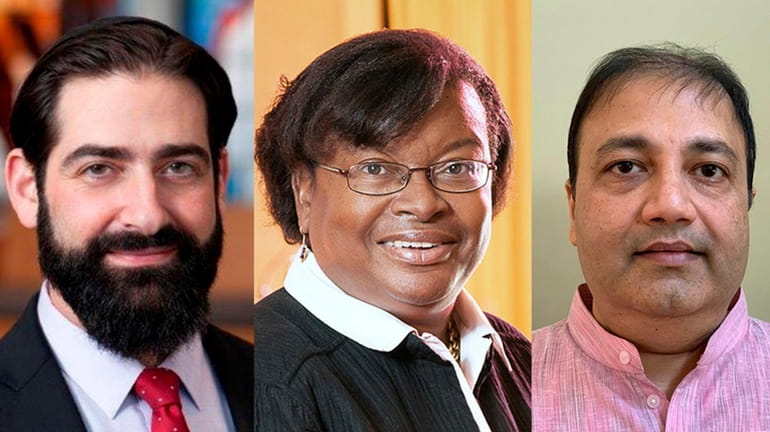Asking the Clergy: What does your faith say about climate change?

From left, Rabbi David J. Lerner of Congregation B'nai Sholom-Beth David of Rockville Centre, the Rev. Natalie M. Fenimore of The Unitarian Universalist Congregation at Shelter Rock, and Nitin Ajmera of the Parliament of the World's Religions. Credit: Ellen Dubin Photography; Unitarian Universalist Congregation at Shelter Rock; Nitin Ajmera
Recent wildfires and floods have been linked by scientists to changes observed in Earth’s climate primarily driven by human activities, particularly the burning of fossil fuels. This week’s clergy discuss why climate change should also concern the faithful.
Nitin Ajmera of Plainview
Chairman, board of trustees, Parliament of the World’s Religions
Tattvartha Sutra, one of the Jain faith’s most important Scriptures, states that all life is codependent. Jains accept this as a guiding principle along with our nonviolent, live-and-let-live philosophy. These tenets guide us and motivate us to live a life that believes in interdependence, coexistence and harmony.
In the name of development and growth, humans have used our natural resources to create a "bigger" and "better" world. We have taken much from nature to create a concrete jungle, which needs constant resources to address wear and tear. Jains believe in limiting our needs according to the guiding principles of Aparigraha — the idea that the more a person possesses in worldly wealth, the greater their likelihood of feeling unhappy and committing sin.
We should use environmental resources to sustain ourselves, not to hoard and waste them. Aparigraha helps us to balance our needs with the stewardship of vital resources. To reverse climate change, we need to believe in the coexistence of all life-forms and to limit the fulfillment of our desires. This will make our Earth a better place for all to live and prosper.
The Rev. Natalie Fenimore
Minister of Lifespan Religious Education, Unitarian Universalist Congregation at Shelter Rock, Manhasset
The Earth is a gift. We honor the creator, what we call spirit of life, by protecting this creation.
Science tells us that human activity does damage to our Earth. A faithful, moral and reasoned response to climate change acknowledges human interconnectedness and responsibility for the Earth. Let’s choose to take on the role of planet protectors.
Our faith demands that concerns for our families, communities and justice be central to our response to climate change. We must support individuals and communities experiencing climate disasters now and prepare to prevent future disasters. We must listen to the voices of young people who are climate activists. Unitarian Universalists work to reverse the damage of human activity in small and simple ways like recycling and reducing plastic use. We also work to understand how heat waves, floods, drought, disease, hunger and migration issues are all part of climate justice.
The Unitarian Universalist Side With Love campaign connects all of our justice work. It asks that we choose love over fear as a spiritual practice, that we stay spiritually grounded, that we work with generosity, humility and courage, and that we develop concrete skills to combat the damage of climate change.
Rabbi David J. Lerner
Congregation B’nai Sholom-Beth David of Rockville Centre
A major tension that underlies the debate over climate change, from a Jewish perspective, can be traced to a scene in the Book of Genesis right after humanity is first placed on this Earth. According to the Hebrew Bible, our initial and seemingly contradictory charge regarding responsibility to nature occurs in Genesis 2:15, where Adam is placed on this Earth to "cultivate it (extract from it) and protect it." (My emphasis.)
There is no argument against the idea that we have dominion over the land. We need to extract resources in order to live, in order to run economies, in order to feed our citizens. But we certainly must never lose sight of the second part of Adam’s charge — stewardship, the attempt at sustainability.
There is an important principle in Jewish scriptural interpretation that no word is extraneous or repetitive. Each word is there to teach a lesson — in this case with regard to how we approach our relationship with nature. We must appreciate cultivation and protection as partners and seek appropriate balance, investing equitable amounts of energy in both endeavors.
DO YOU HAVE QUESTIONS you’d like Newsday to ask the clergy? Email them to LILife@newsday.com.
Gilgo-related search in Suffolk woods ... Urologist trial update ... Construction work zone safety ... Jericho fatal crash
